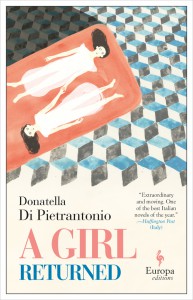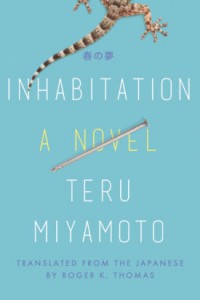From translations by heavyweights like Ann Goldstein and Jennifer Croft to novels by writers appearing for the first time in English, July brings a host of exciting new books in translation. Read on for coming-of-age stories set in Italy and Poland, a drama in rural Argentina, and the tale of a young man and his pet lizard in Japan.

A Girl Returned by Donatella Di Pietrantonio, translated from the Italian by Ann Goldstein, Europa Editions, 2019
Review by Lindsay Semel, Assistant Editor
In A Girl Returned, Donatella Di Pietrantonio’s award-winning novel, a nameless young woman retrospectively narrates the defining event of her adolescence—the year when the only family she has ever known returns her to her birth family. From the title, the reader can already sense the protagonist’s conundrum. A passive object of the act of being returned, her passivity in her own uprooting threatens to define her identity. Ann Goldstein’s searing translation from the Italian inspires the reader both to accompany the narrator as she wades through the tender memories of that time and to reflect on her or his own family relationships through a new lens.
In her adopted family, the narrator was the only child of a wealthy couple. Her birth family is big and poor, and their affection for each other is buried under hard calluses. She looks at what she thinks should be the most intimately familiar setting—her own home and family—with the gaze of an outsider. This masterfully executed act of defamiliarization creates a space in which the novel can interrogate cultural assumptions about family, motherhood, femininity, innocence, childhood, wealth inequality, intelligence, privilege, and sexuality. This passage, in which the narrator’s younger sister tries to rescue her from a confrontation with their mother, demonstrates the tensions that exist within love and between the expected and unexpected:
“No, no, not her!” The cry came from Adriana, who had just returned with Giuseppe, I hadn’t heard the door. “I’ll clean it up now, you can’t hit her, too,” she insisted, stopping her mother’s arm, in an attempt to defend my uniqueness, the difference between me and the other children, including her. I’ve never been able to explain the gesture of a child of ten who was beaten every day but wanted to preserve the privilege that I had, the untouchable sister who had just returned. She got a shove that sent her to her knees on the oily glass.
Ann Goldstein’s sensitive, simple, image-rich translation immediately absorbs the reader in the universe of the text and provokes empathy for the young narrator. Tasteful foreshadowing creates a sense of cohesion. Each character is sublimely human, both lovable and reprehensible, which further complicates the confrontation between the sheltered girl and the complex world to which she is now exposed. The expert pacing of the text emphasizes poignant moments by stopping time to take stock of sensations:
I felt my mother’s hand cross my back and stop decisively on my shoulder blade. I’d sunk my head down between my shoulders, like a dog fearful and pleased by the first caress after long neglect. But I escaped quickly, with an abrupt movement, and pulled slightly away. I was ashamed of her, of her cracked fingers, the faded mourning, the ignorance that slipped out at every word.
Di Pietrantonio and Goldstein have delivered a controlled and exacting interrogation of human relationships that confounds both the mind and the heart in the most delicious way. The girl’s experience challenges her in the moment, but over time the narratorial voice assimilates the strands of information and emotion into something like a sense of self. Perhaps, she begins to discover, with compassion and solidarity we can all transcend that which has befallen us without our permission. She reflects: “My sister. Like an improbable flower, growing in a clump of earth stuck in the rock. From her I learned resistance. We look less like each other now, but we find the same meaning in this being thrown into the world. In our alliance we survived.”

Accommodations by Wioletta Greg, translated from the Polish by Jennifer Croft, Transit Books, 2019
Review by Barbara Halla, Assistant Editor
I love books that don’t try to explain themselves to readers, and Wioletta Greg’s Accommodations (translated by Jennifer Croft and published by Transit Books on July 9) is one of them. The book opens in September 1994 as Wioletta, our narrator, is on the bus to Verga, a workers’ dormitory and her first accommodation in the city of Częstochowa, where she will begin her life as a university student. Accommodations is a slim volume that is not too preoccupied with giving readers answers to the questions it raises throughout its narrative. It is much more focused on atmosphere, on conveying Wioletta’s rather neutral point of view of a new, unforgiving world she is experiencing for the first time.
Chronologically, Accommodations is a follow-up to Greg’s Swallowing Mercury (translated by Eliza Marciniak), a collection of fragments that traces Greg’s coming of age in the small village of Hektary during the late Communist era. But while Swallowing Mercury relayed a somewhat more traditional coming of age story (including an aborted attempt at escaping her hometown), Accommodations is more introspective and contemplative. Less is revealed about Wioletta herself, who seems willing to take in the stories of the characters that surround her and whose actual life events make up a good portion of this book.
Accommodations is split into two parts. In the first portion of the book, unable to find accommodation in university housing, Wioletta is forced to live at Verga, a workers’ home that houses an unconventional group of characters, including two Russian twins who seem to fight for no reason at all, their interactions transcribed into an untranslated Russian that confuses the reader just as it would have confused Wioletta. Alienated by her classmates, whom she tends to avoid, she spends most of her time wandering around Częstochowa and eating Ramen noodles in Verga’s common room, while listening to the unlikely stories of its keeper, Waldek.
But just as Wioletta is beginning to build a home for herself in the cold corridors of the Verga, she is forced to abandon the dorm for reasons that are never made clear, though one may suspect them. Yet, Wioletta never seems too fazed; her biggest worry is being forced to go back home to Hektary. She is rescued by a nun she meets at the train station bar, and so begins the second portion of Accommodations, now set in the Congregation of the Sisters in Christ’s Heart, where Wioletta resides and works as a maid of sorts, helping the nuns around the convent.
Before beginning her career as novelist, Greg was first and foremost a poet, which is perhaps why the best part about Accommodations is the way atmosphere is conveyed in Jennifer Croft’s heartbreakingly beautiful translation. Although actual historical events remain in the background (like Russia’s invasion of Grozny and the advent of the First Chechen War), it is still interesting to see the small details that highlight the advent of a new era for post-Communist Poland: Wioletta listens to Ace of Base and, during one Christmas, she is greeted by the sound of George Michael’s Last Christmas and references Baywatch. Still, her best descriptions are about the city itself:
I sit atop a low wall and, without taking off my sunglasses, I stealthily touch the hot concrete with my palm. The city swells with the cacophony of guitars, harmonicas and drums, but beneath that surface rest layers of silence, pulse underground rivers, only barely making themselves known, as though the ground were a kind of forgetting.
There is an eerie atmosphere that accompanies Accommodations, the feeling that some disaster might await Wioletta just around the corner. And perhaps this feeling of eeriness is intentional: she is a stranger in this city, things really could go wrong and in fact they sometimes do. Just as intentional is perhaps the veil of mystery that surrounds her past and her reluctance to convey to readers anything about said past that is not just a glimpse of a concealed memory (her grandfather calling her to come back home; the silhouette of Kamil, a student she had fallen in love with as a teenager). After all, a new city, even one not that far from home, is a way to discover and reinvent yourself. So, it isn’t so much that Wioletta is reluctant to share with readers who she is, but much more a case of her not knowing it herself.

The Wind That Lays Waste by Selva Almada, translated from the Spanish by Chris Andrews, Charco Press (UK) / Graywolf Press (US), July 2019
Review by Helena Fornells, Assistant Editor
The Wind That Lays Waste (El viento que arrasa) is the first title by Argentinian writer Selva Almada available in English, translated from the Spanish by Chris Andrews. In the midst of a dusty, desolate, droughty region, the car of a reverend on a fervent evangelical mission breaks down. A shiny red truck tows him to the nearest garage, where El Gringo Brauer, a practically-minded mechanic, will attempt to fix the car’s engine. The world of Reverend Pearson and his sulky daughter, Leni, collides with that of Brauer and Tapioca, the teenage boy who lives with him and helps with the cars. Leni is tired of her father’s relentless mission, which has defined her youth; Tapioca yearns to discover what may await him beyond the garage where he has spent most of his life.
On the first page, the readers are abruptly dropped into the story in the middle of a conversation between Brauer and the reverend. From then on, Almada allows the plot tension to develop slowly, giving readers plenty of time to get to know the characters and their backgrounds by observing their slow movements and thoughts over the course of a day, stuck together at the garage while Brauer tries to fix the car.
The careful prose is complemented by the vivid descriptions of the novel’s atmospheric setting: a landscape of drought under an oppressive sun and burning winds, cotton fields, dusty and solitary roads, and piles of wrecked cars surrounded by the Gringo’s dozen dogs. The novel’s descriptive qualities reach their peak just before the menacing storm arrives, when the landscape is portrayed through a dog’s sense of smell:
The smell of feathers rotting in abandoned nests, along with sticks and animal fur. The woody smell of a tree struck by lightning and burnt to the core, invaded by tunnelling grubs and termites, and woodpeckers puncturing the dead bark to eat any living thing they could find. The smell of big mammals: anteaters, foxes, Pampas cats; in heat, or giving birth, or rotted down to skeletons.
Chris Andrews’s translation transports English readers to a local topography of rural northern Argentina, maintaining the poetic tone Selva Almada’s prose is known for. Andrews transmits both the plainness of certain scenes and the evocative tone of the landscape descriptions and the reverend’s impassioned sermons, which are interspersed between chapters. Moreover, the English text retains some of the original Spanish words: “Río Uruguay” is used instead of “Uruguay River,” “vinchuca bugs” do not lose their name, and the last stop of a bus still reads “Balneario” instead of “Baths.”
The nuances of spoken language are also conveyed in the translation. Brauer’s casual use of language and abundant swearing—“Cut the crap, will you?”—contrasts with Pearson’s more elaborate speech: “The final war is coming, José. On the day when the archangels sound their clarions, only those who have given themselves to Christ will be able to hear.”
In the clash of worlds that the encounter between Brauer and the reverend entails, Almada’s highest achievement is the creation of a narrator who presents both sides without judgment or preference, empathizing with each of their perspectives and giving readers an active role in interpreting the moral dilemma presented. The highly tense scenes towards the end of the novel lead to a bittersweet ending. The final pages are the point where readers are urged to take sides, where we are left to decide whether we are happy or frustrated with the fate of the characters.
Selva Almada’s sensitive, searching, and unpretentious prose crafts a powerful story out of austere elements. The intimacy between the small set of characters left to interact in the isolation of the garage grounds heightens the emotional suspense of clashing worldviews, exploring the possible effects of the ideology of adults on young people and questioning the way beliefs are passed on.

Inhabitation by Teru Miyamoto, translated from the Japanese by Roger K. Thomas, Counterpoint Press, 2019
Review by Alyea Canada, Assistant Editor
Inhabitation certainly has a striking premise. Tetsuyuki, a college student on the cusp of graduation, moves to the outskirts of Osaka in order to avoid his late father’s creditors and, in the dark, accidentally nails a lizard to a pillar. The lizard survives.
From there, Teru Miyamoto’s novel unfolds to tell the story of a year in Tetsuyuki’s life punctuated by philosophizing about life and death, but leaves the reader with a sense of a potential not quite reached. There are a lot of threads unwinding in Inhabitiation: Tetsuyuki’s encounters with gangsters sent to collect on his father’s debts; his relationship with his girlfriend, Yōko, whom Tetsuyuki certainly does not deserve; and the machinations of his coworkers at the hotel where he works as a part-time bellhop. All the while, Tetsuyuki takes care of Kin, the lizard, who stubbornly clings to life. The metaphor at work through Kin is obvious (and if you missed it, don’t worry, because Tetsuyuki states it directly): everyone has obligations that pin them down, and you can choose to fight them or let them kill you. For one of Tetsuyuki’s coworkers, Kin becomes a sort of talisman, providing him strength as he finally seeks care for a heart condition. At several points in the novel, Tetsuyuki mentally “turns into Kin” in order to fight for what he wants, most notably when confronting a rival for Yōko’s affection. However, beyond those few moments, Tetsuyuki remains such a passive protagonist that one wonders what his life would be like without Kin’s inspiration.
Inhabitation was originally published in Japan in 1984 and is set in the 1970s, and yet there is a timelessness to it which, at times, works to its detriment. Tetsuyuki and Yōko are unmoored from the world around them, and the events of the novel seem to occur in a vacuum. There is no sense of the politics of Japan at the time or any real stakes in their lives. There is a clear class difference between Tetsuyuki and Yōko; she is much wealthier, and Tetsuyuki hints that wealth is the reason Yōko becomes interested in another man. However, nothing in Yōko’s almost saintlike character implies that she is so concerned with money that she would leave Tetsuyuki for a richer man. Perhaps a greater understanding of where Yōko’s family falls in the social hierarchy of Osaka could help flesh out this tension and create a richer picture of their relationship.
What more than makes up for Inhabitation’s faults is the accuracy with which Miyamoto captures the intensity of youth and the way something can mean everything and nothing to you depending on how the wind blows. Tetsuyuki is a frustrating protagonist: he is passive, judgmental, and prone to feverish rants about the meaning of life and death. And here Inhabitation’s timelessness is an asset, because almost everyone has known, or was, a Tetsuyuki at some point in their lives. Kin eventually comes to serve as a diary for Tetsuyuki. At the end of the day, while feeding and watering the lizard, Tetsuyuki will lament about his life and discuss his ever-changing philosophies. He uses Kin to challenge such thinkers as Shinran and Rikyū, and in the process comes to understand that Kin’s improbable life confirms as much as it denies about existing philosophies surrounding death and karma. At the same time, though, these revelations don’t always feel organic to the book. They are often presented for many pages without interruption and rapidly shift from what Tetsuyuki is saying out loud to his thoughts and back again with little differentiation. More successful is a moment in which Tetsuyuki dreams he lived centuries of lives as a lizard and awakens with a softened demeanor toward Kin. However, Tetsuyuki’s philosophizing scenes are among the richest passages in the novel and provide an opportunity to deep-dive into a story that is otherwise told in broad strokes.
Inhabitation is worth reading. Miyamoto’s quiet prose is skillfully rendered by Roger K. Thomas, whose smooth translation almost makes you forget you’re reading. Among the most widely read authors in Japan, Miyamoto is deserving of a broader audience in the English-reading world. And for readers who are just discovering him, the intimacy of Miyamoto’s tale of a boy and a lizard nailed to a pillar is an excellent place to start.
*****
Read more reviews on the Asymptote blog:

